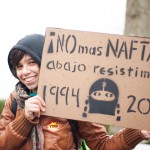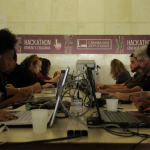“Nº28 10/2015”
Your fingerprint for a kilogram of flour: biometric and privacy in Venezuela
by Digital Rights LAC on December 16, 2015

In a lot of contexts, balance between privacy and comfort is an issue of convenience. In Venezuela, where in order to buy food supplies you must slide both thumbs through a fingerprint scanner and give a big spectrum of personal information, is an issue of survival.
From use to appropriation: Women from Bogota, without time to discover the web
by Digital Rights LAC on December 16, 2015

Are there fewer women than men using the Web? If that’s so, why? Women who do use Internet, perceive it as a truly democratic tool? Web Foundation organization made a report in 10 countries with the intent of answering this key questions. Colombia is the only country in Latin America analyzed by this study.
Negative: a century of photography, on the verge of privatization
by Digital Rights LAC on December 16, 2015

In practice, the extension of the terms would mean to outlaw activities of acquis and digital repositories as diverse as the General Archive of the Nation, the Trapalanda Digital Library of the National Library or community and volunteer projects such as Wikipedia.
The dangers of the TPP to Mexican legislation regarding intellectual property
by Digital Rights LAC on December 16, 2015

On November 6 2015, the Mexican Ministry of Economy made public the Spanish version of the Trans Pacific Partnership (TPP), allowing a wider view about the effects that the chapter regarding intellectual property will have on Mexican legislation and how human rights on the digital environment will be affected. One thing is sure: Mexico has a lot more to lose that it has to win with the made agreements.
Collaborative development in Labhacker: including the “external element”
by Digital Rights LAC on December 16, 2015

The Labhacker came in the wake of innovation laboratories for citizenship that are emerging in various parts of the world. We’re talking about Hacker Laboratory of the Brazilian Chamber of Deputies, which was created from the conducting of a hackathon aimed at developing projects of transparency and participation in the federal legislative process.





